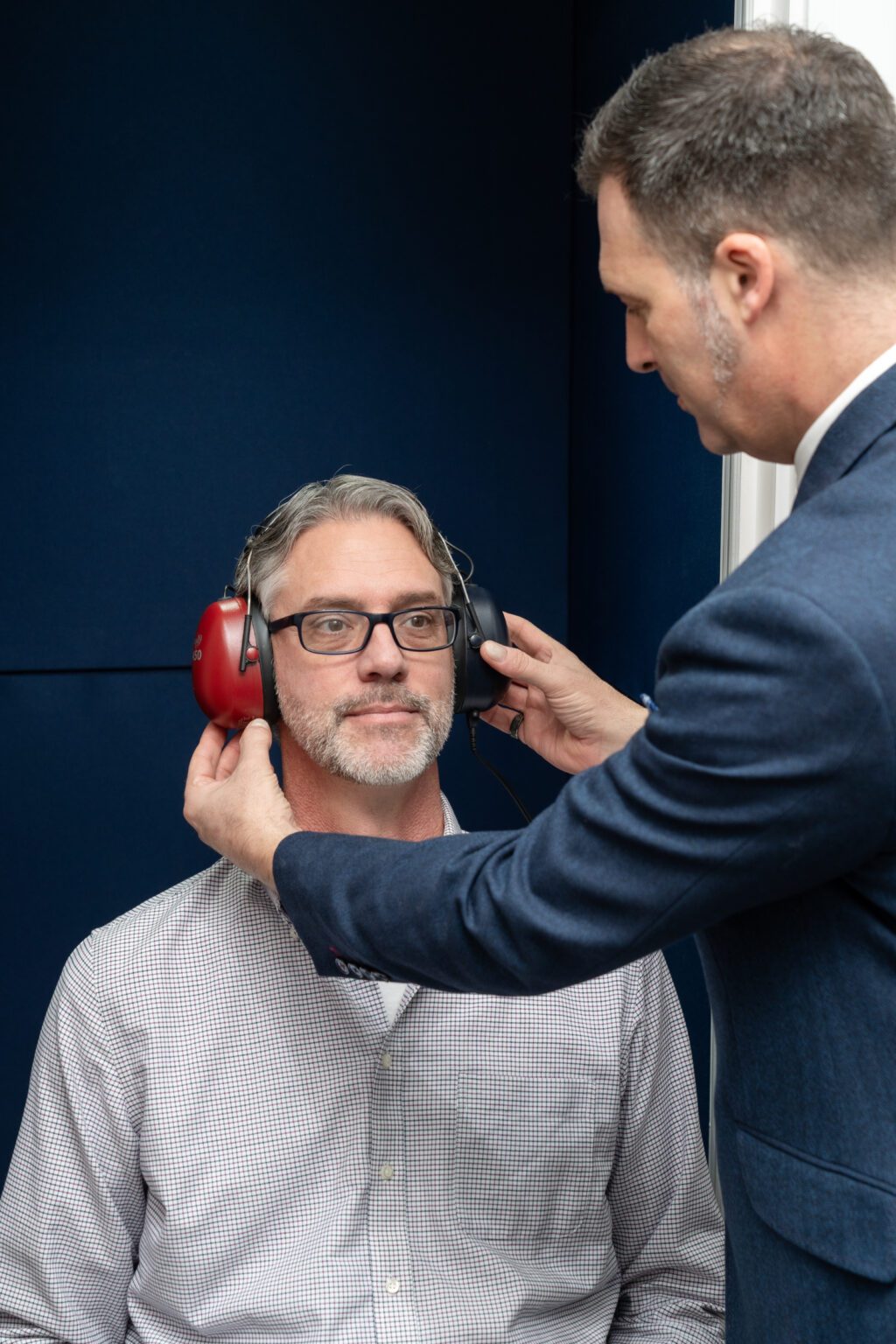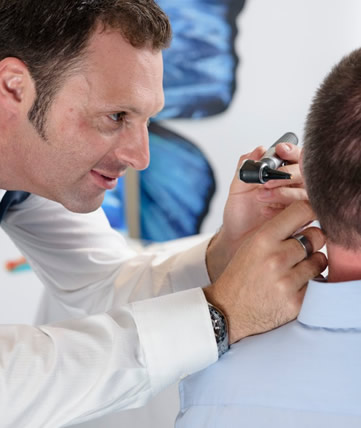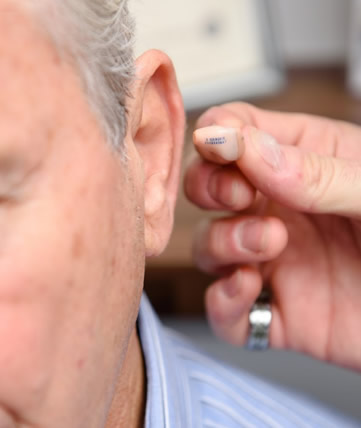Tinnitus symptoms can impact how much you enjoy socialising or participating in sports and other activities. But, groundbreaking tinnitus treatment can reduce or even eliminate tinnitus.
Ready to enjoy a life free of ringing, buzzing, and hissing in your ears?
"*" indicates required fields
It is true that currently, there is no cure for tinnitus, but that doesn’t mean tinnitus treatment can’t make a massive difference to the quality of your daily life. At our Regain Hearing clinics, our expert team of private audiologists offer advanced bespoke tinnitus treatment in the UK to help give our patients the relief they deserve. Start living life the way you want to — free from tinnitus and its impact on what you choose to do.
Discover how life-changing, personalised tinnitus treatment in the UK, with a private audiologist at Regain Hearing clinics in London and Kent or in your own home, can bring you instant relief from tinnitus symptoms.

Tinnitus can be mild and a slight inconvenience or interrupt your life, causing various issues such as sleep problems, depression, and anxiety. Our exclusive and highly effective tinnitus treatments provided by a private audiologist at one of our Regain Hearing clinics or in your home might immediately decrease — or even remove the cause of your tinnitus symptoms — straight away.
Tinnitus rarely goes away, but just because it doesn’t yet have a cure, it doesn’t mean you have to suffer from the constant noise and discomfort it causes. Our pioneering tinnitus treatments have been developed by Lee Fletcher (RHAD) (BSHAA) — Company Director and Principal Audiologist at Regain Hearing. Finely tuned since 2013, based on the most recent research at Regain Hearing, we don’t just provide “cookie cutter” treatments.
Before starting treatments, we carefully assess your tinnitus symptoms to develop a customised tinnitus treatment plan. Many of our patients experience dramatically reduced tinnitus symptoms — and in some cases, these life-altering treatments have stopped the tormenting sounds of tinnitus.
Our team of qualified and experienced audiologists at Regain Hearing is committed to giving you the best care possible and genuinely cares about what matters to you. We think anybody should have the opportunity to receive the highest standard of hearing care and the most advanced tinnitus treatment in the UK.
Therefore, our audiologists will treat you at our Regain Hearing clinics, or you can arrange for one of them to come to your house with the most advanced equipment and expertise. Before we start any tests, we will consider and listen to what you are concerned about. Our friendly and attentive audiologists provide the latest cutting-edge hearing tests and tinnitus treatment.
We can determine the cause of your tinnitus symptoms or other ear problems if you make an appointment with one of our audiologists. If we are not able to provide a diagnosis, we can send a referral to your GP to arrange for you to see an appropriate NHS specialist.
You can be confident that our experienced audiologists at Regain Hearing will always give you the best treatment available.

Visit our Regain Hearing clinics in London and Kent today to experience an efficient, first-class healthcare service to help those with tinnitus, hearing loss, and hearing-related issues.
Get in touch today to book a tinnitus treatment consultation, hearing test, or microsuction earwax removal with our award-winning, qualified and caring audiologists.
Has a medical professional told you to “just live with it” while you have been trying to ignore the uncomfortable and distressing symptoms of tinnitus? This is not an acceptable reaction anymore, and it’s an uneducated way of thinking. Tinnitus treatment was previously unavailable, but that is not the case today.
Advancements in tinnitus treatment procedures are backed by science, and the results our expert audiologists see in our patients daily are nothing short of remarkable. So why haven’t you heard about them until now? Because they’re new and underreported.
At Regain Hearing, you will experience innovative, personalised care from a specialist private audiologist, who will take great satisfaction in providing you with a bespoke tinnitus treatment plan to help alleviate your tinnitus symptoms and relieve you from this frustrating condition. Get the help you need and the relief from tinnitus that you deserve today.
Do these testimonials sound familiar to you? Don’t let tinnitus symptoms rule your life — if you would like to seek advice for tinnitus treatment, feel free to contact us today for what could be a life-changing consultation.

As part of our tinnitus treatment, a Regain Hearing private audiologist will conduct a comprehensive consultation, beginning with an in-depth interview using the Tinnitus Handicap Inventory (THI). This is a world-recognised scoring system that helps us to accurately grade the severity of your tinnitus symptoms.
Once the grade of your symptoms is established, further tests are conducted to guide us in formulating your personalised tinnitus treatment plan.
Your assessment for our groundbreaking tinnitus treatment includes the following:
After your tinnitus assessment, we will discuss and implement a tinnitus treatment plan designed solely for you. Your plan is unique, so it might involve a combination of different treatments. These can include sound cancellation, hearing aids, tinnitus management apps, and occasional sound and behavioural modification therapy.
During your first consultation, we’ll determine the most appropriate tinnitus treatment methods for you and thoroughly explain how it works and what to expect. Every Regain Hearing private audiologist is fully qualified, caring, patient, and knowledgeable.
Once you leave our clinic or our audiologist leaves your home, we will always be on hand to answer any questions you might have about your personalised tinnitus treatment plan. Our complete aftercare service means we will continue to support you during your tinnitus treatment, and that means we can adjust your plan, if required, to ensure you get relief from your tinnitus symptoms.


Whether you’re juggling a hectic work schedule, are unable to travel to one of our clinics in London or Kent, or would prefer an appointment in the comfort and privacy of your residence, you can book one of our Regain Hearing private audiologists to visit you at home and provide you with our at-home hearing test service and tinnitus treatment. Don’t suffer — arrange for our friendly and highly skilled audiologists to visit you.
Delivering the same standard of care and expertise you would expect at our specialist hearing clinics; our caring audiologists use advanced, high end and easily transportable computerised equipment. So rest assured, if we come to your home, you will receive the same service, accurate results and diagnosis.
Whether you choose to have a tinnitus consultation in one of our private hearing clinics or your own home, our audiologists will provide you with the same groundbreaking customised tinnitus treatment plan.
It doesn’t matter if your tinnitus is caused by mild earwax buildup, noise exposure, or profound hearing loss; tinnitus symptoms can still be debilitating and life-changing. The best way to treat tinnitus is to know exactly why it’s happening.
Book your tinnitus test with a private audiologist at Regain Hearing today, and we’ll help you find the right tinnitus treatment. Get the tinnitus relief you need — and start living your life how you want to.
Sometimes, we can’t treat your tinnitus symptoms, but our qualified private audiologists will never leave you wondering what to do next. We believe it is our duty of care to work with you to find the right professional to help you.
Sometimes, tinnitus is caused by other problems we cannot treat. If we discover your case is unsuitable for our treatment during our consultation and tinnitus test, we will refer you to an ear, nose, and throat specialist (ENT) via your GP.
A specialist can rule out any health-related conditions that could be causing your tinnitus symptoms — and identify if they can provide treatment through medical or surgical intervention.
3D Walkthrough Of Our Maidstone Branch
Regain Hearing clinics are staffed by qualified and compassionate audiologists. Our specialist care encompasses tinnitus treatment, earwax removal, hearing tests, custom ear plugs and hearing protection, hearing aids, and much more.
Tinnitus is often described as “ringing in the ears,” but the sound itself might also resemble a “humming,” “roaring,” “hissing,” or “whooshing,” among others. These sounds have no external source and are perceived only by the individual, either in both ears, in one ear, or sometimes inside their head.
Every person with tinnitus symptoms experiences it differently; some may hear noise continuously, while for others, it might come and go. Some may hear it softly in the background, constantly, or in quiet environments, while severe tinnitus symptoms will cause noise that can be noticeable, even over significant noise.
Tinnitus is a common condition, with the most recent research suggesting that one in seven adults experience it at some point. Those experiencing symptoms of tinnitus for six months or more are said to suffer from “chronic” tinnitus — with 1-3% of sufferers in that category impacted by symptoms of anxiety and, or depression that significantly affect their quality of life.
At Regain Hearing clinics, our private audiologists take tinnitus symptoms and find the most effective tinnitus treatment for each patient extremely seriously. We know first-hand how debilitating the condition can be and deal with every challenge head-on, devoting our efforts to combating your unique tinnitus symptoms, however mild, moderate or severe. For us, nothing beats positively impacting tinnitus and helping you regain peace and quiet.
Tinnitus is not a disease conventional medicine can treat but a symptom of changes in the auditory system. Decades of research into the cause of tinnitus indicates that, in most cases, tinnitus directly relates to a loss of auditory output due to damaged hair cells in the inner ear. The most common cause of this damage is loud noise; once the hairs are damaged, they cannot regenerate.
Medical professionals are still trying to discover how and why tinnitus affects some people with noise-induced hearing loss but not others.
However, it is widely accepted that tinnitus symptoms can be caused by several conditions, including the following:
If sound becomes muffled in one or both ears and you feel a fullness in the ear, you might have ear wax buildup. Other symptoms of compacted earwax include earache, pain and — you guessed it — tinnitus. If excess earwax is the cause of your tinnitus, the symptoms should ease and disappear once the blockage is treated.
We offer quick and painless microsuction earwax removal in Eltham, Maidstone, Broadstairs, Northfleet, Chatham, Croydon, and Ramsgate, and we can also come to your home.
The prevalence of tinnitus symptoms increases with age-related hearing loss, called presbycusis, with around one in five people aged between 55 and 65 experiencing some type of tinnitus symptoms. Tinnitus is closely linked with hearing loss, and around 80% of
patients with severe hearing loss will also experience tinnitus symptoms. This is why hearing aids can often help to reduce tinnitus symptoms.
The severity of each condition isn’t mutually exclusive. An individual may have severe hearing loss but only experience intermittent ringing noises in quiet environments. Similarly, another person may have good hearing but unbearable torturous tinnitus.
Permanent hearing damage and high-frequency tinnitus can result from exposure to loud noises. If you work or have worked in noisy environments — such as construction sites, factories, and loud music venues — where you experience high-decibel sounds from industrial power tools, jet aircraft, gunfire, etc., it’s critical to protect your hearing from further damage.
The best way to stop tinnitus symptoms from worsening and prevent noise-induced hearing loss is to wear custom-made ear plugs or ear protection.
The Autonomic Nervous System (ANS) regulates our internal organs and some of our muscles. We’re often unaware of this because it does so involuntarily. Every minute of the day, our hearts beat faster or slower on autopilot without us consciously realising it.
This is why, although it is not a cause of tinnitus, the ANS also influences how people with tinnitus perceive its severity and how much attention they place on it. If you can train your brain to ignore tinnitus, it will often only be perceptible in the background. But if the tinnitus becomes a high priority (for instance, if it’s perceived as a threat), then the brain learns to focus on the sound, even when there is other background noise — even loud noise.
When this happens, the limbic system (the part of the brain governing emotional response) produces a negative reaction to tinnitus symptoms, resulting in anxiety or stress. This creates a vicious ongoing cycle, where the tinnitus leads to stress — making the symptoms worse because you’re stressed about them! Tinnitus hearing aids that provide tinnitus masking are a well-known treatment and one of the best ways to break this cycle.
Whatever the underlying cause of your tinnitus, typically, it should be treatable, allowing us to alleviate or even eliminate your symptoms. We recommend booking a tinnitus test to get an accurate diagnosis, advice, and support on the next steps.
Every journey to a tinnitus-free life starts with a tinnitus test. Our consultation service evaluates your tinnitus symptoms with state-of-the-art audio technology. We’ll help you learn what kind of tinnitus you are experiencing, the possible causes of your tinnitus symptoms, and the very best course of specialised tinnitus treatment.
Don’t let tinnitus rule your life. Our team of caring and highly skilled, qualified, private audiologists can help you get the best possible tinnitus treatment in the UK — Get in touch with us today to book a tinnitus consultation, and let us give you the help you deserve.
Treatment for tinnitus is often earwax removal or hearing aids. While both treatments can help tinnitus symptoms, they are not treatments for chronic tinnitus unless hearing aids are provided as part of a comprehensive tinnitus masking treatment. This is one of the key treatments for tinnitus, which is not offered as part of a standard hearing test and hearing aid fitting. It’s important to understand that hearing aids are not considered treatment on their own, as they may only help relieve symptoms if you are diagnosed with hearing loss.
At Regain Hearing, we will provide you with a tinnitus diagnosis that includes an in-depth consultation with a qualified and experienced audiologist using the Tinnitus Handicap Inventory (THI). You will also receive tests to ensure a customised treatment plan can be devised for the exact pitch and frequency of the tinnitus sounds you are currently experiencing.
The treatment plan involves various components and may also include tinnitus retraining with sound therapy. This is bespoke for each person and tailored to their tinnitus symptoms.
Services
Locations

© Copyright Regain Hearing 2024
Company No. 07124759